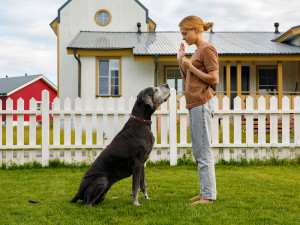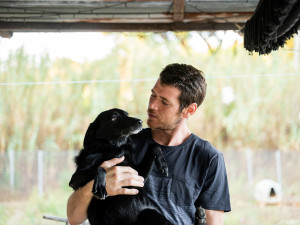How to Stop Your Dog From Barking
The top five reasons dogs bark—and how to get them to relax a bit.

share article
In this Article:
Identify the Reason for the Barking opens in a new tab Continue Training for Barkingopens in a new tab
Barking is your dog’s way of chatting you up. They’re just talking, getting their perspective out there. But sometimes, it can be a little...much. Dogs who bark excessively can cause big problems for their humans, but even though it may seem completely out of control, this behavior can be modified to a bearable level.
Dogs barkopens in a new tab for many reasons — to get attention, as a warning, in response to other barking dogs, out of boredom, out of anxietyopens in a new tab, when excited, in the caropens in a new tab, at mail carriersopens in a new tab or at menopens in a new tab — and it’s important to identify the triggers before beginning training. Read on to learn why your dog is barking and what you can do about it.
First, identify the reason for the barking
To deal with dog barking, first identify the cause. Common causes include boredom, loneliness, anxiety, fear, territoriality, and attention-seeking. Once you know the cause, you can take steps to address it. If you are having trouble dealing with the barking on your own, consult with a professional dog trainer or behaviorist.
1. The trigger: boredom
The Fix: These days, most dogs who were once bred to do a certain job find domestic life boring, and barking relieves that boredom. If this is the case, the first step in how to train a dog not to bark is increased exerciseopens in a new tab and mental stimulationopens in a new tab. This will refocus your dog’s mind to something more positive and help tire them out.
2. The trigger: attention seeking
The Fix: If your dog barks to get attention, don’t reward their demands. Yelling at your dog is inadvertently rewarding them for barking, even if the communication is negative. It’s best to ignore the barking. Wait for five seconds of quiet, then reward your dog with attention. This way, your dog learns that they get nothing from you when they bark but gets everything when they’re quiet.
3. The trigger: excitement
The Fix: A dog who barks when excited (i.e., before going for a walkopens in a new tab or being fedopens in a new tab) is harder to work with because your pre-departure or pre-food cues are usually highly ritualized. Again, do not reward your dog with what they want until they’re calm. For example, if the dog barking happens as soon as you go for the leash, drop the leash and sit down.
Keep repeating this until your dog is quiet. If you successfully attach the leash, but your dog barks as soon as they get outside, immediately go back inside. This technique requires patience, but if you are diligent, your dog will quickly learn that quiet equals a walk.
4. The trigger: anxiety/fear
The Fix: Dogs who suffer from anxiety opens in a new tabwhen left alone will often bark a lot during the first 30 minutes after departure, while others continue until their person comes home. You’ll need to hire a traineropens in a new tab to help; separation anxietyopens in a new tab can be a very difficult behavior to modify.
5. The trigger: territorial/alarm
The Fix: If your dog barks excitedly in the backyardopens in a new tab, for example, immediately take them into the house and only allow them out again when they’re quiet. Keep repeating if necessary, but never leave them in the backyard unattended. If your dog barks at other dogs or people in or outside of your home, it might be because they haven’t received adequate socializationopens in a new tab, and they feel uncomfortable.
In general, it’s important to note that it’s normal for a dog to bark to alert their pack about anyone (or anything) approaching their space.
6. The trigger: pain or discomfort
The Fix: If your pup has been romping around outside without close supervision — or say, they stepped on something sharp during a walk — you may not know that they’re injured. Excessive barking, howling or growling can be a sign that they’re hurt and in pain. Try to identify what’s bothering them and whether there’s any sort of injury. While you’re examining them, be careful because some dogs become reactive when they’re hurt. Then take them to the vet to be vet ASAP to be treated.
7. The trigger: certain noises or smells
The Fix: Sometimes it might seem like your dog is barking at absolutely nothing. But their senses — especially scent and smell — are attuned differently than ours are to their surrounding environment. For example, dogs can hear high-pitched sounds we can’t, so they may be barking at something you’re unaware of.
They also have a super strong sense of smell, so your pup may be picking up on a scent that is undetectable to you — and they may be trying to alert you to it! Instead of ignoring them or barking back, acknowledge that you hear them.
8. The trigger: medical conditions
The Fix: If you notice that your dog’s barking is accompanied by other changes in behavior — panting or pacing, for example — it may be an indication of a more serious health issue. Especially as your pup ages, they may be barking because they’re experiencing a change in hearing or vision. Or it could be a sign of some other medical condition that’s developing, so take your dog to the vet to be evaluated if the barking persists.
Continue to train your dog to manage barking
Once you’ve identified the reason your dog is barking, it’s important to train them accordingly. For example, if you’ve figured out that they are barking for attention, you want to ignore it. But you don’t want to ignore it if you suspect there’s a medical issue. Continuing to train your dog over time and being consistent with your behavioral response should fix the issue.
Can positive reinforcement be used to train a dog to stop barking?
Positive reinforcementopens in a new tab is generally a successful training technique with dogs — and it can be helpful when you’re trying to get your dog to stop barking. When your pup is exhibiting the behavior that you desire (i.e., they stop barking when you cue them or they refrain from barking when they normally would), reward it with their favorite treat. Over time, they will learn that not barking is better.
FAQs (People also ask):
When should I seek professional help for my dog’s barking?
If you are having a hard time particularly with your dog around other dogs or strangers, you should get the help of a positive reinforcement professional dog traineropens in a new tab.
How can I discourage nighttime barking?
Make sure your dog gets plenty of exercise during the day. Ensure they have a comfortable place to rest, you can try a calming treat or playing white noise at night, as well.
References:
Excess Barking: a More Complex Problem Than it Would Appearopens in a new tab
Barking in Family Dogs: an Ethological Approachopens in a new tab
Barking in Domestic Dogs: Context Specificity and Individual Identificationopens in a new tab
Acoustic Parameters of Dog Barks Carry Emotional Information For Humansopens in a new tab
Noise in Dog Kennelling: is Barking a Welfare Problem For Dogs?opens in a new tab
Assessment and Treatment of Excessive Barking in the Domestic Dogopens in a new tab

Victoria Stilwell, CCPDT
Victoria Stilwell is a world-renowned dog trainer, certified by the Animal Behavior and Training Associates Inc. and star of It’s Me or the Dog. A bestselling author, TV personality, and founder of both the Victoria Stilwell Academyopens in a new tab and Positivelyopens in a new tab (where she is editor-in-chef), Stilwell frequently appears in the media as a pet expert and is widely recognized and respected as a leader in the field of animal behavior.
She also serves on the Advisory Boards for DogTVopens in a new tab, Dognition, The Grey Muzzle Organizationopens in a new tab, RedRoveropens in a new tab, W-Underdogsopens in a new tab and Canine Assistantsopens in a new tab, and she is a member of the U.S. Association of Pet Dog Trainers (APDT) and the International Association of Animal Behavior Consultants (IAABC).
Related articles
![woman gives small black dog treat for sitting]() opens in a new tab
opens in a new tabYour Dog Should Do This 30-Day Training Challenge
It’s like your 30-day yoga challenge — except with way more training treats.
![Old Great Dane dog sitting in grass and looking up at the hand of his owner during a training sessions]() opens in a new tab
opens in a new tabAre You Making These Common Dog Training Mistakes?
Pro Karen London, PhD shares the most common dog training errors and how to correct them.
![Woman sitting with her dog outdoors]() opens in a new tab
opens in a new tabHow to Talk to Your Dog, According to Science
Baby talk works on puppies. As for adult dogs, that’s still up for debate.
![Pet parent training large dog in yard]() opens in a new tab
opens in a new tabAre Friends and Family Derailing Your Dog’s Training?
What to do when your best-laid training plans are sabotaged.
![A man holding a dog with an unsure look on its face.]() opens in a new tab
opens in a new tab“Why Does My Dog Bark at Men?”
What to do when your dog barks at the men in your life.






